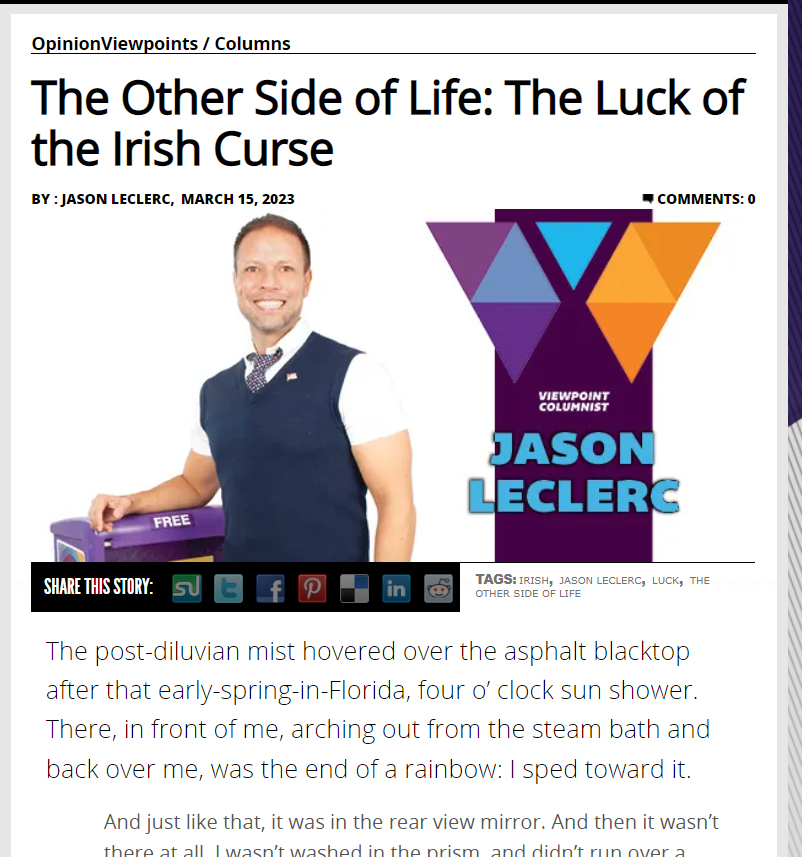The Luck of the Irish Curse
The Luck of the Irish Curse
Read this essay as it appears in Watermark
The post-deluvian mist hovered over the asphalt blacktop after
that early-spring-in-Florida, four o’ clock sun shower. There, in front of me,
arching out from the steambath and back over me, was the end of a rainbow: I
sped toward it. And just like that, it was in the rear view mirror. And then it
wasn’t there at all. I wasn’t washed in the prism, and didn’t run over a pot of
gold, it just wasn’t there anymore: not behind me or stretched out further in
front of me. It was, perhaps, the most anticlimactic event of my life. I often
think about it and its non-eventness and try to put meaning into it, but can’t.
There’s nothing to sink my pen into or wrap my mind around: no profundity, not
even a picture for proof. Recollecting this Sunday drive leaves me emptier and
emptier each time I recollect it: a piling up of nihilist meaninglessness that,
over the years, scoops out the lessons of a lifetime like dung-clumps out of an
unfinished collection.
As an essayist, I am called to piece meanings together,
connecting causes and effects: pulling the universal out of the specific. As a
modernist, I am called to build that meaning upon the result, the “what
follows” of an event. As a social scientist, I don’t start at the beginning to
build a narrative, but rather start from the meaningful result and work
backwards in space-time toward the cause: identify the result, imbue the result
with meaning, determine the cause and use it to reify the meaning of the result.
Rinse. Repeat.
This is how history is built, an accretion of events
projecting the present onto the past. By using this same approach, alternate
myths and narratives live side by side. It starts with a meaningful now, interpreting
causal antecedents along the way. It’s how Cold Warriors trace American history
to the genius of the founding fathers, Lost Causers trace it back to the genius
of the Confederacy, and Anti-Racists trace it back to 1619.
If this is the philosophical paradigm in which we operate,
then driving through the end of a rainbow—an event which should be engorged
with metaphorical and spiritual meaning—but finding no meaning to derive is
like an Irish curse: having all the parts necessary, but somehow lacking
in girth or stature to bring the mutual satisfaction needed to connect the top
and the bottom of the page. Without a meaningful now, there can be no
meaningful then.
Call me old-fashioned.
Some of us have lived this existential nightmare, creating
stand-in causes: “I’m lucky”, “I’m blessed”, “I earned it.” What is the luck
of the Irish, then, if it isn’t also a curse? Luck, good or bad, is
a useless identifier of a cause; it rips a hole in the science of history.
There is neither agency nor responsibility. There is no “what follows.”: Hey,
I’m lucky I was born gay, right?
Call me old-fashioned.
Blessed is more than a trampstamp, pelvic girdle,
skank flank or a faithful Sunday morning assertion—“I have more than I need or
than you can handle.” I’m no fundamentalist. Claiming to be blessed by some
higher power is well and good until you’re un-blessed: scapegoating the Almighty.
Maybe I’m trying too hard, but can somebody be blessed and unblessed simultaneously:
financially, anatomically, culturally
undeserving but the recipient of a cosmic gift from a giver and a taker away. “Blessed”
isn’t a cause, it's a copout. But, hey, I’m blessed to have been born gay,
right?
Call me old-fashioned.
Then, there is the third way along the path from cause to
meaninglessness: Earned. This is the most sinister of the reproducible postmodern
constructions. This cause is a self-reflexive fallacy. “I am successful because
I work hard, you conversely, are unsuccessful because you don’t.” Claiming hard
work as a cause claims too much responsibility without enough meaning. It’s
shallow and callous.
Hey, hey, I’ve worked hard to be all this kind of gay,
right?
I’m not Irish. Well, not genetically anyhow (noticeably free
of that particular curse). Maybe
if I were of that lineage, I’d have something more to give to this self-indulgent
discourse than a lamentation on the postmodern condition. Maybe I could derive
a meaningful event out of seeing something in front of me and that same
something behind me but never having crossed through it—an anti-limit, a
space-time divergence. Maybe If I had the luck of the Irish, or had been
blessed by a power outside of me or just worked harder at my craft, I could let
a non-event be an event and could give it meaning and a history. Maybe there
are just some things in life that don’t mean anything, and maybe it’s really
all the things in life, and maybe accepting that makes luck the result instead
of the cause.
Call me old-fashioned.
If I have to choose a manufactured cause, I’d rather give
God and myself a pass when things don’t go my way—when they need a meaning—and
choose luck: Neither blessed nor hard-earned, neither unblessed nor lazy, neither
responsible nor irresponsible.
I’ll meander through my remaining years looking for another
rainbow’s-end and its technicolor meaning. I’ll count on luck, I suppose, until
I don’t have to anymore.
And here I am, having pulled meaning out of a non-event, a
lucky, postmodernist hypocrite after all.
#Blessed #HardWorkPaysOff
Read More of my poetry, essays, and short stories at Momentitiousness.com



Comments
Post a Comment